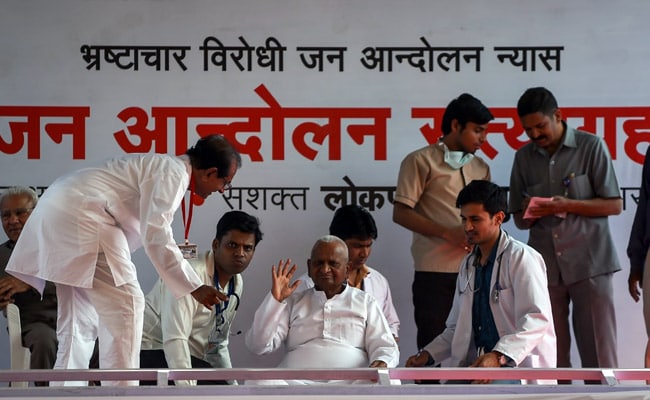
Anna Hazare began his second 'indefinite hunger strike' at Delhi's Ramlila Maidan over Lokpal
New Delhi:
Kisan Baburao Hazare, better known as Anna Hazare today started an indefinite hunger strike with a demand for the government to set up a Lokpal. He began his strike at Ramlila Maidan this morning - the same ground where his stir for an anti-corruption body seven years ago caught the country's imagination. In 2011, Anna Hazare sat on a similar hunger strike for Lokpal or a national ombudsman. This time he has a new target. Previously, he targeted the then UPA government at the centre, and his anti-corruption movement had caught the imagination of millions of Indians. This time Anna Hazare's target is the Narendra Modi-led BJP government, which has not been able to finalise a Lokpal to investigate cases if corruption.
On August 31, Anna Hazare had written to PM Modi stating that he would launch an agitation over the appointment of Lokpal and Lokayukta as well as implementation of the Swaminathan Commission report. Anna Hazare wrote, "Since there has been no response from your side, I have decided to launch an agitation in Delhi. I will continue with the protest until the demands are met". He also mentioned that in his next letter he would inform him about the place and the date of his agitation.
 Key demands of Anna Hazare's indefinite hunger strike this time are setting up of the Lokpal at the centre and Lokayuktas in the states and implementation of the Swaminathan Commission report that assures fair pay for farmers.
Key demands of Anna Hazare's indefinite hunger strike this time are setting up of the Lokpal at the centre and Lokayuktas in the states and implementation of the Swaminathan Commission report that assures fair pay for farmers.
The Jan Lokpal Bill (Citizen's ombudsman Bill) is a draft anti-corruption bill drawn up by prominent civil society activists seeking the appointment of a Jan Lokpal, an independent body that would investigate corruption cases, complete the investigation within a year and envisages trial in the case getting over in the next one year.
The Lokayuktas is an anti-corruption ombudsman organisation in the states. Once appointed, Lokayukta cannot be dismissed nor transferred by the government, and can only be removed by passing an impeachment motion by the state assembly.
Swaminathan Commission report: The National Commission on Farmers, chaired by Professor MS Swaminathan, submitted five reports through the period December 2004 - October 2006. Following from the first four, the final report focused on causes of farmer distresses and the rise in farmer suicides, and recommends addressing them through a holistic national policy for farmers. The findings and recommendations encompass issues of access to resources and social security entitlements.
On August 31, Anna Hazare had written to PM Modi stating that he would launch an agitation over the appointment of Lokpal and Lokayukta as well as implementation of the Swaminathan Commission report. Anna Hazare wrote, "Since there has been no response from your side, I have decided to launch an agitation in Delhi. I will continue with the protest until the demands are met". He also mentioned that in his next letter he would inform him about the place and the date of his agitation.

Anna Hazare Hunger Strike: He sat on a similar hunger strike for Lokpal in 2011.
The Jan Lokpal Bill (Citizen's ombudsman Bill) is a draft anti-corruption bill drawn up by prominent civil society activists seeking the appointment of a Jan Lokpal, an independent body that would investigate corruption cases, complete the investigation within a year and envisages trial in the case getting over in the next one year.
The Lokayuktas is an anti-corruption ombudsman organisation in the states. Once appointed, Lokayukta cannot be dismissed nor transferred by the government, and can only be removed by passing an impeachment motion by the state assembly.
Swaminathan Commission report: The National Commission on Farmers, chaired by Professor MS Swaminathan, submitted five reports through the period December 2004 - October 2006. Following from the first four, the final report focused on causes of farmer distresses and the rise in farmer suicides, and recommends addressing them through a holistic national policy for farmers. The findings and recommendations encompass issues of access to resources and social security entitlements.
Track Latest News Live on NDTV.com and get news updates from India and around the world

